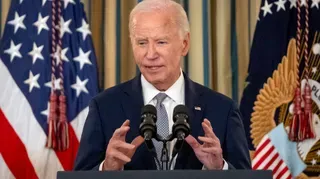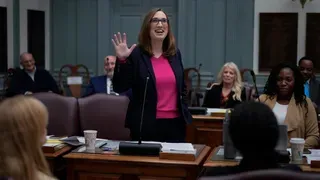
February 7, 2024
It's a Mismatch on the Economy: Inflation Wanes, but Voters Worry about Getting By
Fatima Hussein and Josh Boak READ TIME: 4 MIN.
Bartender Catey Regis had a pricey misadventure buying a used car recently – an experience that speaks to why voters are worrying about the U.S. economy going into this year's presidential election.
Over three years at Founders Brewing, the 25-year-old saved enough money pouring IPAs, stouts and porters to pay cash for a 2009 Toyota Corolla. But then the car's transmission went kaput and she had to take out a costly loan to fix it, and keep her toehold in the middle class.
"To me, it's a telltale sign about the economy," Regis explained from a bar stool after her shift. She plans to vote for President Joe Biden over Republican front-runner Donald Trump but, frankly, wishes there was someone else on the ballot.
By the numbers, the U.S. economy looks impressively strong. Growth surged 2.5% last year. Inflation has eased. Unemployment is a healthy 3.7%. Biden is telling voters that the numbers point to a brighter future, while Trump says the gains are merely the fumes of his time in office.
But conversations with dozens of voters around Grand Rapids – a city of 200,000 in one of Michigan's swing counties – show they're thinking about the economy through their own experiences. And they tell a story about an economy, a country and a world that seems to many to have spun out of control.
Most are sure the U.S. is in a recession. (It's not.) High grocery prices have them down. For renters, high home prices are putting the American dream out of reach. There is a sense of generational decline and more barriers to genuine financial security.
"The price of everything is going up and even though they are trying to raise the minimum wage, most people are getting paid the same," said 28-year-old Cameron Brown, who offered a rushed assessment as he hurried past outside Westwood Mall in suburban Kentwood. He said he'll vote for Trump because he "runs the country like a business."
There are multiple signs in economic reports that people's feelings about the economy have improved as inflation has eased after hitting a four-decade peak in the middle of 2022. People are finding ways to get by, even if few say they're getting ahead.
However, conversations with voters uncovered doubts about Biden's ability to fix the nation's challenges and concerns among some that Trump could make those challenges worse.
There's a persistent concern about a recession. Some voters worried about the fighting in the Middle East and Ukraine starting a third world war. Others saw the influx of migrants at the U.S. southern border as a threat to national security and a strain on government finances.
"I feel like there's a recession and I'm living it," says Scott Thompson, a 44-year-old Caledonia small business owner who drives for Uber on the side. "The cost of living, groceries, cereal, car insurance, and the equipment for my business is more expensive."
Thompson, who owns a telecom reseller, plans to vote for Trump in 2024. "I think Trump did a good job – no, he wasn't very presidential – but he did what he said he was going to do," Thompson said as he drove a fare to the mall.
Trump cut taxes for corporations and most households at the end of 2017, as well as imposing tariffs on Chinese imports and borrowing trillions of dollars for pandemic aid. The Biden administration kept the tariffs and launched another round of pandemic aid, as well as making substantial investments in infrastructure, manufacturing and renewable energy.
But Teresa Johnson worries about paying her $1,500 rent. Housing costs have been rising faster than overall inflation, a problem – compounded by higher mortgage rates – that has led more people to rent as prices have risen in the most desirable neighborhoods.
"The president needs to fix that," said Johnson, 62, a Black single parent in Kentwood who is a Democrat but open to backing Nikki Haley, the former South Carolina governor who is running against Trump for the Republican nomination.
The Biden administration has also sent conflicting messages in some cases to voters. Domestic oil production is at record highs, helping to keep down gasoline prices. But as part of the effort to combat climate change, Biden is also providing incentives to support the development of renewable energy and phase out fossil fuels.
Charles Kroll, CFO of a Grand Rapids fuel distribution company, stopped to chat after a recent local "state of business" event and said he's worried about the impact of Biden's climate policies – he calls it the president's "war on oil and gas." Kroll voted for Trump in 2016, Biden in 2020 and is undecided this time.
Grand Rapids is the seat of Kent County, which backed Trump in 2016 and then flipped to Biden in 2020. About 10% of the county's population is Black and more than 7% is multiracial, according to the Census Bureau. Nearly 40% of its population has a college degree. And of its college graduates, more than half are younger than 45 – a population that has become an essential Democratic constituency.
But those voters' support of Biden is generally rooted in an opposition to Trump, who was impeached twice as president and since leaving office has been criminally indicted on an array of activities including the possession of classified material and efforts to overturn the 2020 election results.
"I will not vote for someone who could cause so much instability," said Arick Davis, a 32-year-old part-owner of Last Mile Café in South East Grand Rapids.
But Davis is well aware that consumers are feeling pressure on how much they can spend and the challenge that Black-owned businesses like his have with accessing lines of credit to expand. To the extent that the economy is doing well, there is little confidence that it is necessarily sustainable.
"I can tell people are more aware of how much they are spending – and I feel like people are having a hard time budgeting," Davis said as he waited for a Grand Rapids Chamber of Commerce "State of Business" event to start. He'll vote for Biden, he says, but unenthusiastically.







